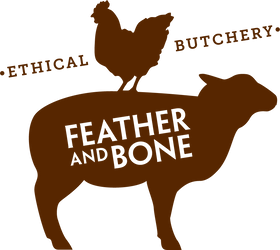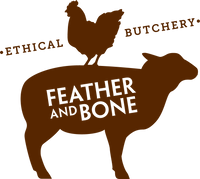The 30 hour proposal & South Hill vealers
First published in the Feather and Bone newsletter on 1 February 2011.
An issue was raised in the press last week that goes to the heart of the beliefs and practices of Feather and Bone and the producers we represent. We suspect that if you're on our mailing list then it's probably the kind of issue you will care about too.
The '30 hour' proposal
Last Friday 21 January 2011, an article about bobby calves called 'Cruelty claims over calves starved for last hours' appeared on page 3 of the Sydney Morning Herald.
Bobby calves are male calves from dairy cows that are destined to be sold as veal and are usually aged five days or less when dispatched for slaughter. Animals Australia are protesting against a proposal that would allow these calves to be denied liquid food for the last 30 hours of their lives.
According to the proponents of the 30 hour proposal, this would not cause the calves any additional distress (there isn't any mention of the effect on the cows). The proposal is part of a government review of the 'Land Transport Standard'. It is endorsed by Australian Dairy Farmers who argue strongly against the objections raised by Animals Australia which are that it would make the process even more cruel and inhumane than it is already.
The other end of the spectrum
We think it's very important that you know that the veal we sell is about four months old when it leaves the farm. By this age, although still drinking milk, the calf is grazing confidently and can be weaned with the minimum amount of stress for both cow and calf. Both Wildes Meadow (South Hill Farm) and Organic Ways (Franckin's Biodynamic Farm) report that if separation occurs before both cow and calf are ready - about four months - both animals become very distressed and, in fact, the cow may carry the memory through to the next pregnancy by displaying heightened fear and distrust of the farmer.
Our veal producers are fiercely protective of their land and animals and not will send calves to slaughter until they feel both cow and calf are ready and that separation can occur with minimum stress. Consequently, you will find the veal we stock very different from the very young veal available elsewhere.
Alan and Clara Bateman from Wildes Meadow are lodging an objection to the proposal (closing on 3 February) and Clara wrote us an impassioned email which included an excellent summary of the way they raise their veal calves (this is essentially the same process followed by our other veal producers).
We've spent a lot of time at Wildes Meadow and we can vouch for the care described below.
How Wildes Meadow deal with veal calves (written by Clara Bateman)
- All breeding cows have identification tags in their ears so the link between cow and calf is always clear.
- Calving cows are checked morning, lunch and evening.
- Each new calf is tagged with the birth date, mother's ID and calf ID number. This allows us to ensure who belongs to whom in case of a calf becoming ill or injured and needing care which would necessitate it and its mum being separated from the herd while treatment takes place. We always try to bring another cow and calf in at the same time so that the mothers don't suffer stress from being separated from the rest of the herd.
- Calves due for slaughter are separated off from the herd with their mothers and kept in our dispatching yards for three days before they go. They and their mothers are fed good quality hay and the yards are well-shaded in summer and protected from the wind.
- Calves go to slaughter in twos or threes and always with calves they have been running with for at least a month because, like people, cattle don't like being shut up in confined spaces with others they don't know well.
- We are fortunate to live only 40 minutes from our abattoir. Our vealers are transported at 5.30 am and slaughtered immediately they arrive at the abattoir so the stress is kept to the lowest minimum possible.
- We keep very careful records and we can guarantee that none of the vealers is under 4 months old. We believe that at that age they have become emotionally independent from their mothers, although of course they are still feeding 3 times a day.
Clara Bateman went on to respond directly to the quote from the Australian Dairy Farmers representative that appeared in the SMH article.
"In a recent article in the SMH a dairyman, defending the proposed 30 hour no feeding suggestion for bobby calves was reported as saying that he had frequently seen a cow feed her calf and then hide it in the reeds and go off and graze all day.
In our 14 years experience of cattle breeding, we have never known a cow leave her calf hidden for any longer than 10 hours before calling it to come and feed. 10 hours is a far cry from 30 hours.
Again in our experience, by 3 days old, calves are feeding 3-5 times a day, depending on their mother's milk supply. When they are not feeding they are either strengthening their
legs doing star jumps, curled up sleeping, or being licked and cleaned up by their mothers as they urinate or defecate.
At 10 days they start to really interact with other calves of the same development stage. They play chasing, head butting and practice ignoring mum when she calls them to feed. At 4 weeks calves start to try to copy their mothers' grass eating habit, taking just one strand of grass at a time and sucking at it and concentrating very hard. They will be feeding from their mothers at first light, then about noon, 5pm and just before sleep time.
At 6 weeks their appetite and ability to suck really well and hard kicks in and they consume a huge amount of milk in a very short feeding time. It looks like they are feeding less, but at each feed they are draining their mother's udder. A cow's nutritional requirements really escalates from then on to keep up a good milk supply.
At about 8 weeks, calves start to vary their diet and really try to eat some grasses and barks and not just for pretending. But milk is still their staple and remains so up to about 12 weeks. Their ability to know what minerals they need is already coming in to play and separate minerals put out for 'at liberty' supplementation are only sampled if needed. What a pity us humans have lost that discernment ability!!"
In our humble opinion here at Feather and Bone, we feel that the '30 hour' proposal is symptomatic of an overall approach to food production and land management which we wholeheartedly reject. We think we're extremely fortunate that there are farmers like the Batemans and the others we represent who choose to farm with a different level of care and attention altogether.




If I could get veal from such a situation I would change my mind and purchase it. Having lived in the country and allowed the neighbouring organic farmer to adjist his pregnant dairy mums until after birthing on our property, I saw how gorgeous their wee boys were – a good life before a quick death and allowing mum time to bond is so much better than down the road where we heard new mums crying out because their boys were gone from them too soon.
Leave a comment